The Travel and Tourism Business Toolkit: A Comprehensive Report
VerifiedAdded on 2020/12/30
|17
|5252
|498
Report
AI Summary
This report, focusing on the travel and tourism industry, provides a comprehensive overview of revenue management principles, human resource management practices, and financial reporting. It begins by exploring the rationale and principles of revenue management, including pricing, forecasting, customer focus, and optimization, and how these apply to the industry. The report then examines specific revenue management tools such as rate shoppers, book engines, and differentiation pricing. It further delves into the HR life cycle, specifically in the context of a waiter job role, detailing the stages of recruitment, education, motivation, evaluation, and celebration. Finally, the report discusses the importance of financial statements and budgeting in controlling business performance, using Thomas Cook Group Plc as a case study throughout. The report highlights the interconnectedness of these business functions in driving success within the dynamic travel and tourism sector.
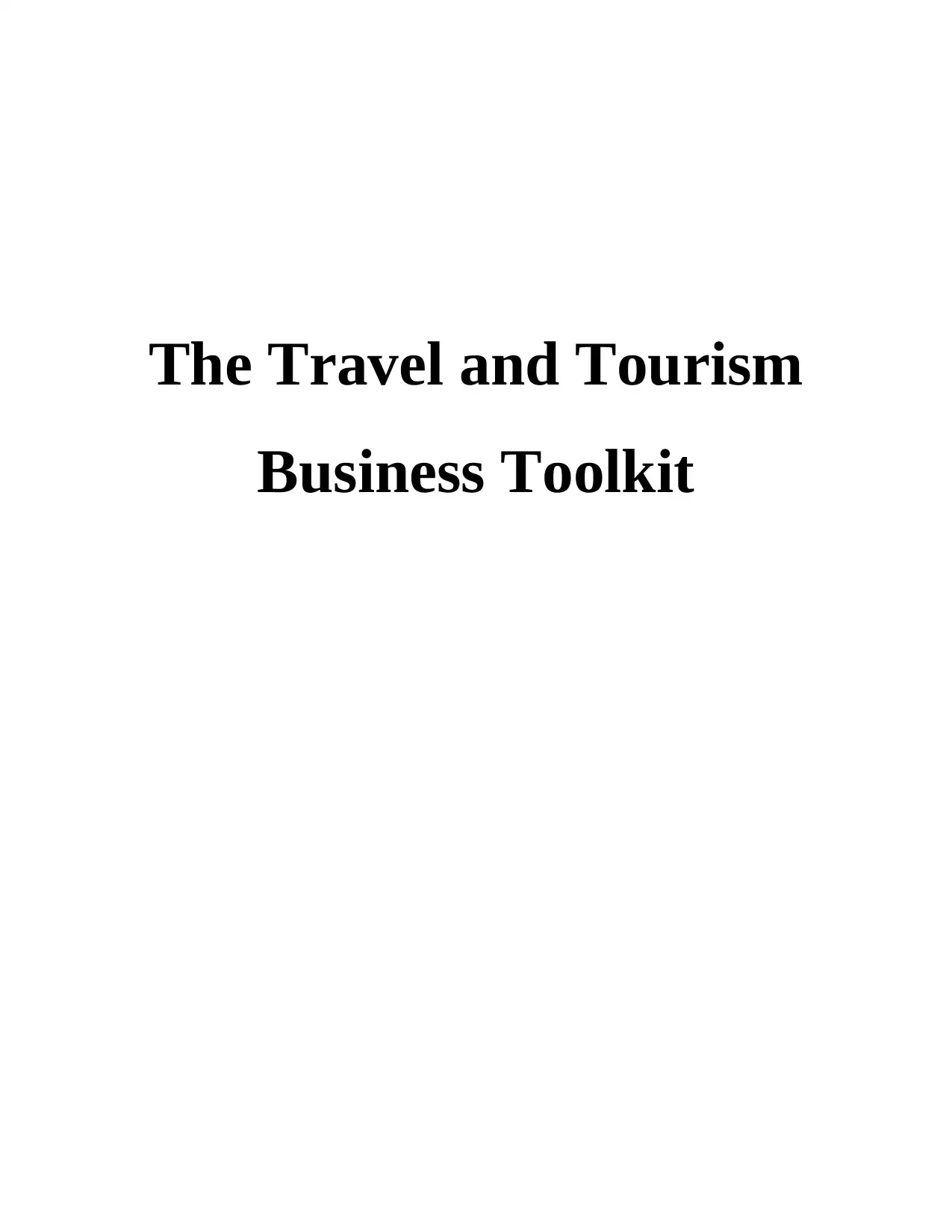
The Travel and Tourism
Business Toolkit
Business Toolkit
Paraphrase This Document
Need a fresh take? Get an instant paraphrase of this document with our AI Paraphraser
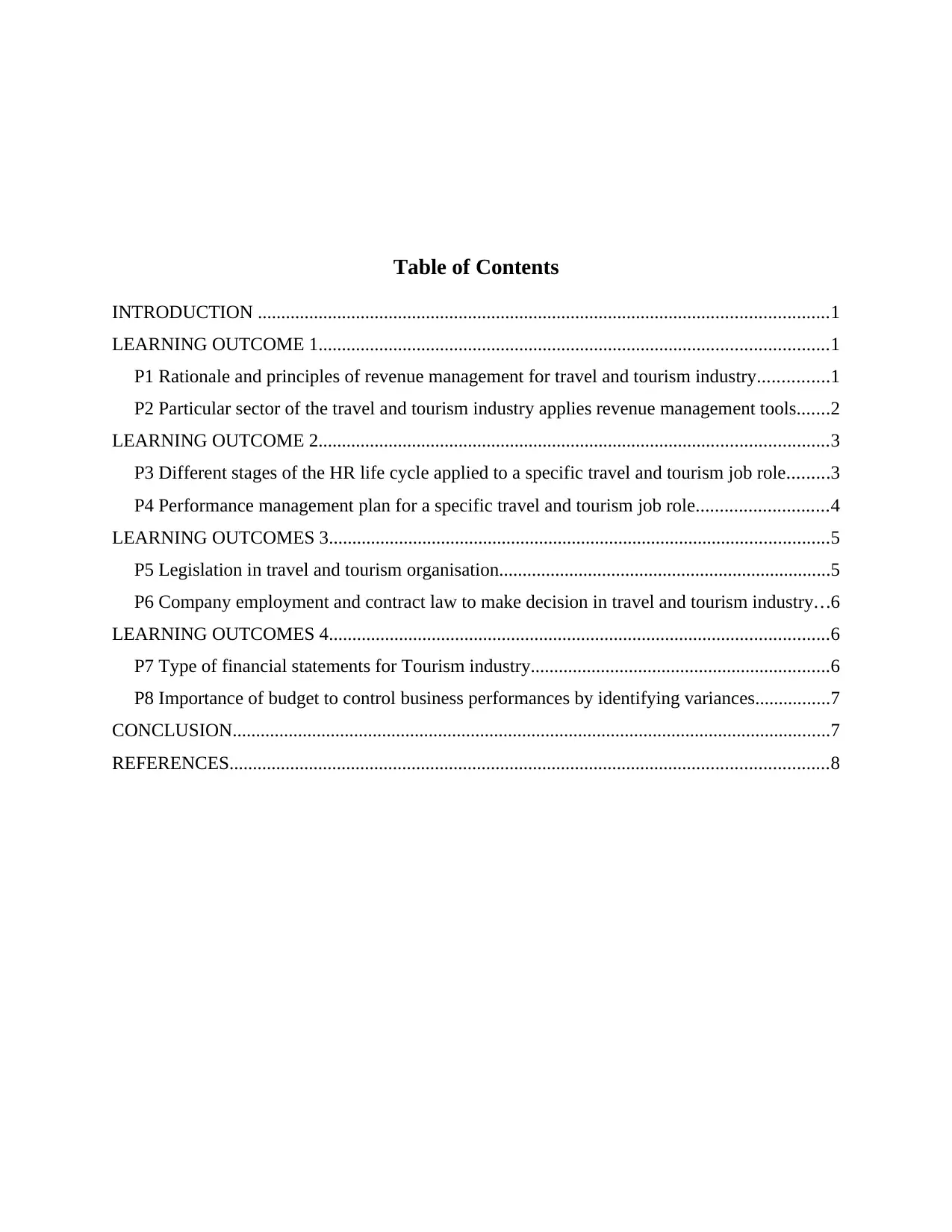
Table of Contents
INTRODUCTION ..........................................................................................................................1
LEARNING OUTCOME 1.............................................................................................................1
P1 Rationale and principles of revenue management for travel and tourism industry...............1
P2 Particular sector of the travel and tourism industry applies revenue management tools.......2
LEARNING OUTCOME 2.............................................................................................................3
P3 Different stages of the HR life cycle applied to a specific travel and tourism job role.........3
P4 Performance management plan for a specific travel and tourism job role............................4
LEARNING OUTCOMES 3...........................................................................................................5
P5 Legislation in travel and tourism organisation.......................................................................5
P6 Company employment and contract law to make decision in travel and tourism industry...6
LEARNING OUTCOMES 4...........................................................................................................6
P7 Type of financial statements for Tourism industry................................................................6
P8 Importance of budget to control business performances by identifying variances................7
CONCLUSION................................................................................................................................7
REFERENCES................................................................................................................................8
INTRODUCTION ..........................................................................................................................1
LEARNING OUTCOME 1.............................................................................................................1
P1 Rationale and principles of revenue management for travel and tourism industry...............1
P2 Particular sector of the travel and tourism industry applies revenue management tools.......2
LEARNING OUTCOME 2.............................................................................................................3
P3 Different stages of the HR life cycle applied to a specific travel and tourism job role.........3
P4 Performance management plan for a specific travel and tourism job role............................4
LEARNING OUTCOMES 3...........................................................................................................5
P5 Legislation in travel and tourism organisation.......................................................................5
P6 Company employment and contract law to make decision in travel and tourism industry...6
LEARNING OUTCOMES 4...........................................................................................................6
P7 Type of financial statements for Tourism industry................................................................6
P8 Importance of budget to control business performances by identifying variances................7
CONCLUSION................................................................................................................................7
REFERENCES................................................................................................................................8
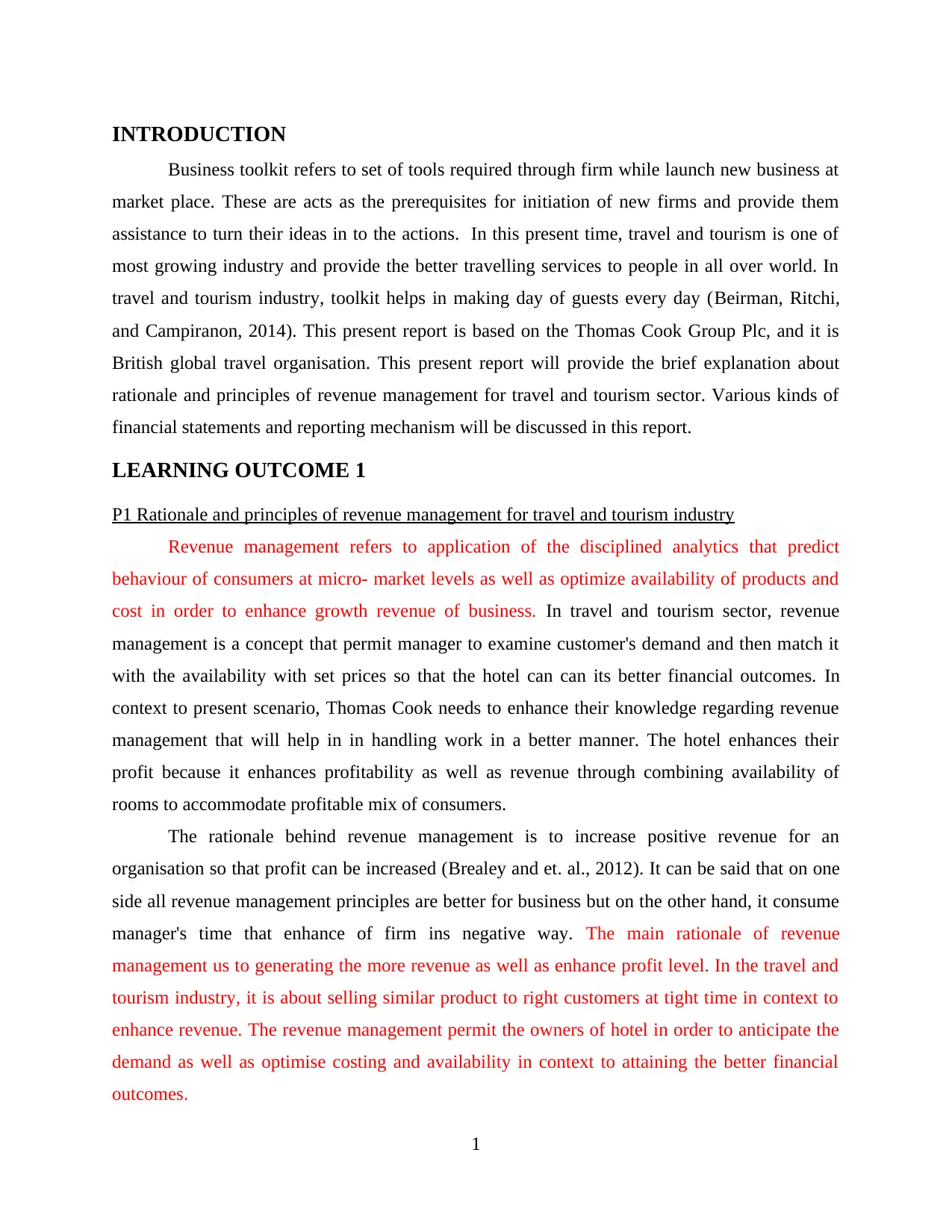
INTRODUCTION
Business toolkit refers to set of tools required through firm while launch new business at
market place. These are acts as the prerequisites for initiation of new firms and provide them
assistance to turn their ideas in to the actions. In this present time, travel and tourism is one of
most growing industry and provide the better travelling services to people in all over world. In
travel and tourism industry, toolkit helps in making day of guests every day (Beirman, Ritchi,
and Campiranon, 2014). This present report is based on the Thomas Cook Group Plc, and it is
British global travel organisation. This present report will provide the brief explanation about
rationale and principles of revenue management for travel and tourism sector. Various kinds of
financial statements and reporting mechanism will be discussed in this report.
LEARNING OUTCOME 1
P1 Rationale and principles of revenue management for travel and tourism industry
Revenue management refers to application of the disciplined analytics that predict
behaviour of consumers at micro- market levels as well as optimize availability of products and
cost in order to enhance growth revenue of business. In travel and tourism sector, revenue
management is a concept that permit manager to examine customer's demand and then match it
with the availability with set prices so that the hotel can can its better financial outcomes. In
context to present scenario, Thomas Cook needs to enhance their knowledge regarding revenue
management that will help in in handling work in a better manner. The hotel enhances their
profit because it enhances profitability as well as revenue through combining availability of
rooms to accommodate profitable mix of consumers.
The rationale behind revenue management is to increase positive revenue for an
organisation so that profit can be increased (Brealey and et. al., 2012). It can be said that on one
side all revenue management principles are better for business but on the other hand, it consume
manager's time that enhance of firm ins negative way. The main rationale of revenue
management us to generating the more revenue as well as enhance profit level. In the travel and
tourism industry, it is about selling similar product to right customers at tight time in context to
enhance revenue. The revenue management permit the owners of hotel in order to anticipate the
demand as well as optimise costing and availability in context to attaining the better financial
outcomes.
1
Business toolkit refers to set of tools required through firm while launch new business at
market place. These are acts as the prerequisites for initiation of new firms and provide them
assistance to turn their ideas in to the actions. In this present time, travel and tourism is one of
most growing industry and provide the better travelling services to people in all over world. In
travel and tourism industry, toolkit helps in making day of guests every day (Beirman, Ritchi,
and Campiranon, 2014). This present report is based on the Thomas Cook Group Plc, and it is
British global travel organisation. This present report will provide the brief explanation about
rationale and principles of revenue management for travel and tourism sector. Various kinds of
financial statements and reporting mechanism will be discussed in this report.
LEARNING OUTCOME 1
P1 Rationale and principles of revenue management for travel and tourism industry
Revenue management refers to application of the disciplined analytics that predict
behaviour of consumers at micro- market levels as well as optimize availability of products and
cost in order to enhance growth revenue of business. In travel and tourism sector, revenue
management is a concept that permit manager to examine customer's demand and then match it
with the availability with set prices so that the hotel can can its better financial outcomes. In
context to present scenario, Thomas Cook needs to enhance their knowledge regarding revenue
management that will help in in handling work in a better manner. The hotel enhances their
profit because it enhances profitability as well as revenue through combining availability of
rooms to accommodate profitable mix of consumers.
The rationale behind revenue management is to increase positive revenue for an
organisation so that profit can be increased (Brealey and et. al., 2012). It can be said that on one
side all revenue management principles are better for business but on the other hand, it consume
manager's time that enhance of firm ins negative way. The main rationale of revenue
management us to generating the more revenue as well as enhance profit level. In the travel and
tourism industry, it is about selling similar product to right customers at tight time in context to
enhance revenue. The revenue management permit the owners of hotel in order to anticipate the
demand as well as optimise costing and availability in context to attaining the better financial
outcomes.
1
⊘ This is a preview!⊘
Do you want full access?
Subscribe today to unlock all pages.

Trusted by 1+ million students worldwide
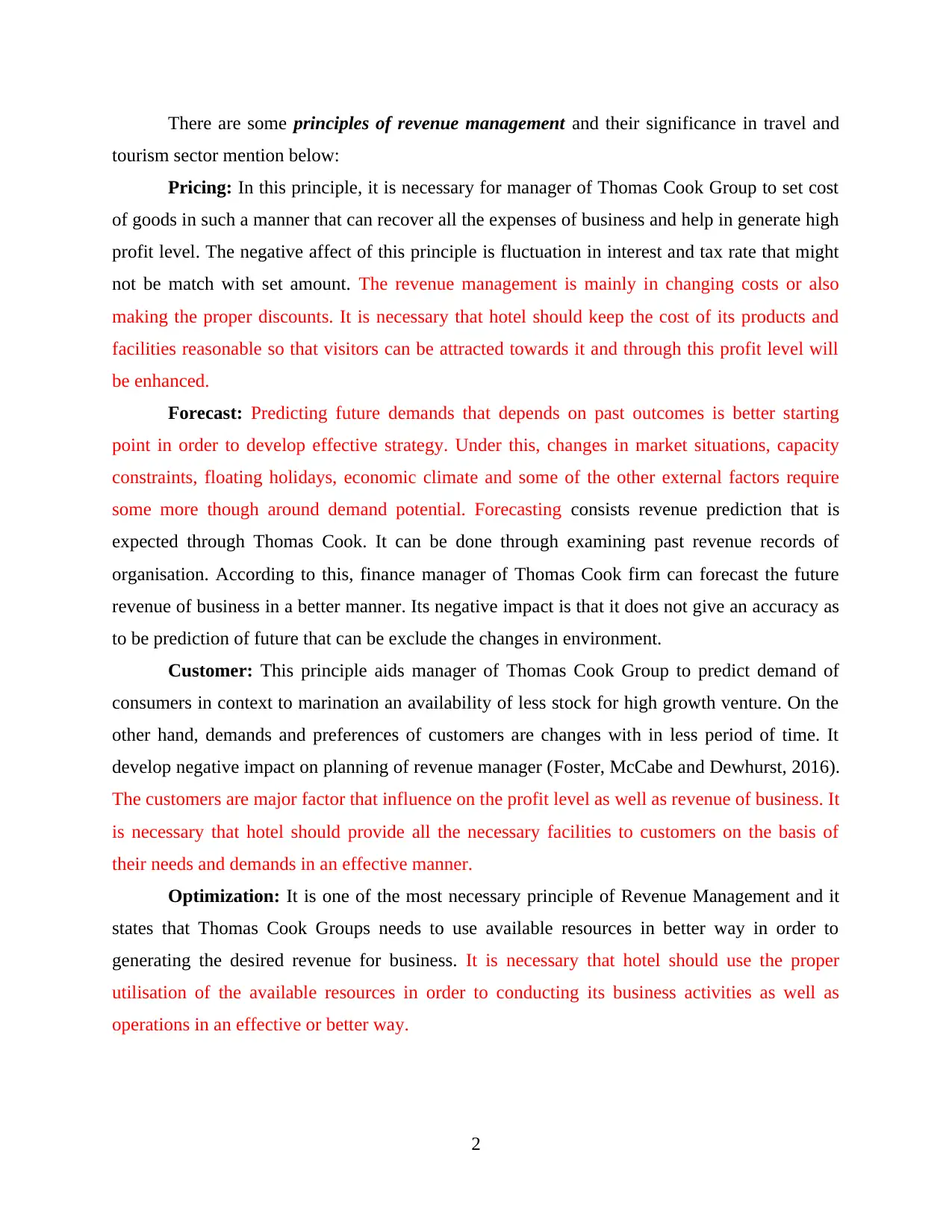
There are some principles of revenue management and their significance in travel and
tourism sector mention below:
Pricing: In this principle, it is necessary for manager of Thomas Cook Group to set cost
of goods in such a manner that can recover all the expenses of business and help in generate high
profit level. The negative affect of this principle is fluctuation in interest and tax rate that might
not be match with set amount. The revenue management is mainly in changing costs or also
making the proper discounts. It is necessary that hotel should keep the cost of its products and
facilities reasonable so that visitors can be attracted towards it and through this profit level will
be enhanced.
Forecast: Predicting future demands that depends on past outcomes is better starting
point in order to develop effective strategy. Under this, changes in market situations, capacity
constraints, floating holidays, economic climate and some of the other external factors require
some more though around demand potential. Forecasting consists revenue prediction that is
expected through Thomas Cook. It can be done through examining past revenue records of
organisation. According to this, finance manager of Thomas Cook firm can forecast the future
revenue of business in a better manner. Its negative impact is that it does not give an accuracy as
to be prediction of future that can be exclude the changes in environment.
Customer: This principle aids manager of Thomas Cook Group to predict demand of
consumers in context to marination an availability of less stock for high growth venture. On the
other hand, demands and preferences of customers are changes with in less period of time. It
develop negative impact on planning of revenue manager (Foster, McCabe and Dewhurst, 2016).
The customers are major factor that influence on the profit level as well as revenue of business. It
is necessary that hotel should provide all the necessary facilities to customers on the basis of
their needs and demands in an effective manner.
Optimization: It is one of the most necessary principle of Revenue Management and it
states that Thomas Cook Groups needs to use available resources in better way in order to
generating the desired revenue for business. It is necessary that hotel should use the proper
utilisation of the available resources in order to conducting its business activities as well as
operations in an effective or better way.
2
tourism sector mention below:
Pricing: In this principle, it is necessary for manager of Thomas Cook Group to set cost
of goods in such a manner that can recover all the expenses of business and help in generate high
profit level. The negative affect of this principle is fluctuation in interest and tax rate that might
not be match with set amount. The revenue management is mainly in changing costs or also
making the proper discounts. It is necessary that hotel should keep the cost of its products and
facilities reasonable so that visitors can be attracted towards it and through this profit level will
be enhanced.
Forecast: Predicting future demands that depends on past outcomes is better starting
point in order to develop effective strategy. Under this, changes in market situations, capacity
constraints, floating holidays, economic climate and some of the other external factors require
some more though around demand potential. Forecasting consists revenue prediction that is
expected through Thomas Cook. It can be done through examining past revenue records of
organisation. According to this, finance manager of Thomas Cook firm can forecast the future
revenue of business in a better manner. Its negative impact is that it does not give an accuracy as
to be prediction of future that can be exclude the changes in environment.
Customer: This principle aids manager of Thomas Cook Group to predict demand of
consumers in context to marination an availability of less stock for high growth venture. On the
other hand, demands and preferences of customers are changes with in less period of time. It
develop negative impact on planning of revenue manager (Foster, McCabe and Dewhurst, 2016).
The customers are major factor that influence on the profit level as well as revenue of business. It
is necessary that hotel should provide all the necessary facilities to customers on the basis of
their needs and demands in an effective manner.
Optimization: It is one of the most necessary principle of Revenue Management and it
states that Thomas Cook Groups needs to use available resources in better way in order to
generating the desired revenue for business. It is necessary that hotel should use the proper
utilisation of the available resources in order to conducting its business activities as well as
operations in an effective or better way.
2
Paraphrase This Document
Need a fresh take? Get an instant paraphrase of this document with our AI Paraphraser
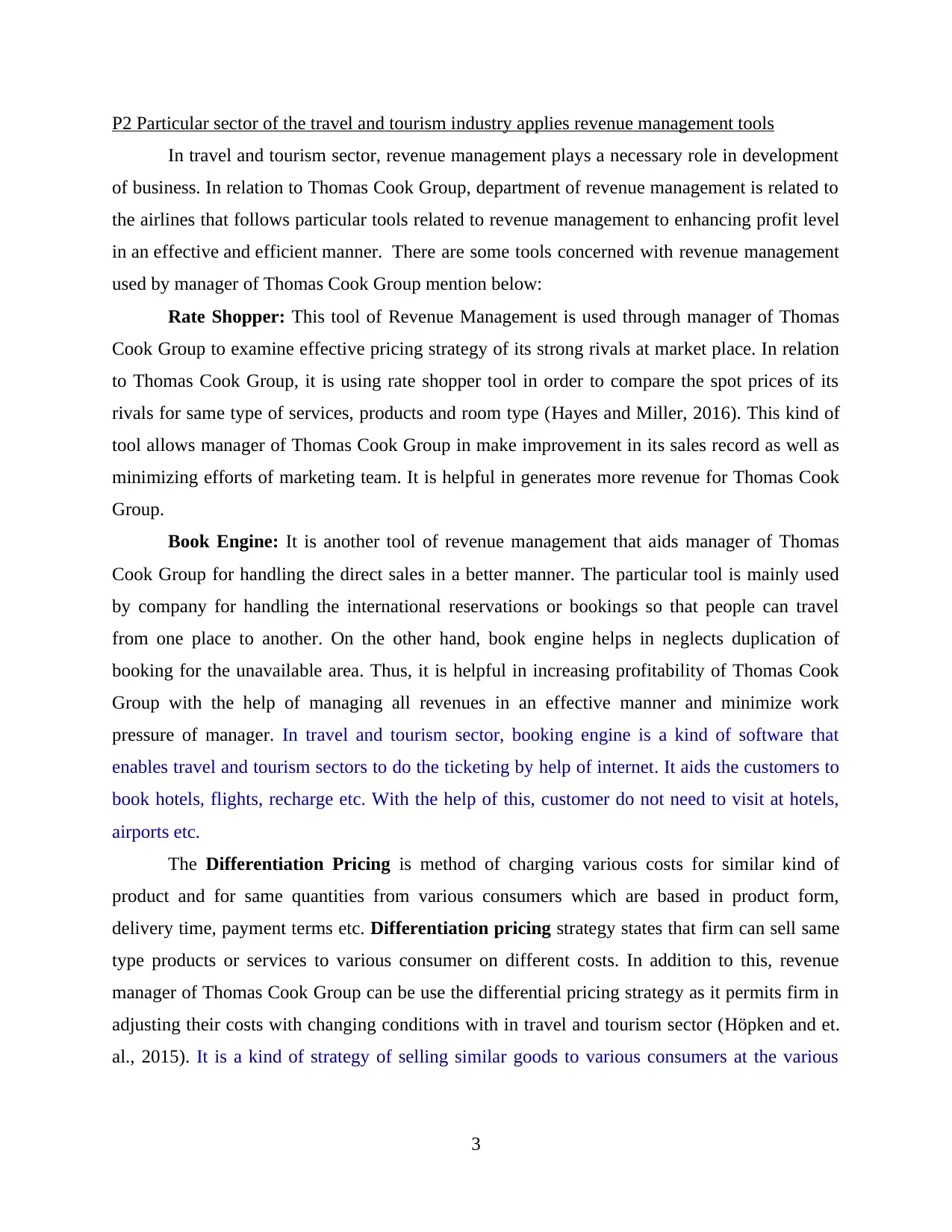
P2 Particular sector of the travel and tourism industry applies revenue management tools
In travel and tourism sector, revenue management plays a necessary role in development
of business. In relation to Thomas Cook Group, department of revenue management is related to
the airlines that follows particular tools related to revenue management to enhancing profit level
in an effective and efficient manner. There are some tools concerned with revenue management
used by manager of Thomas Cook Group mention below:
Rate Shopper: This tool of Revenue Management is used through manager of Thomas
Cook Group to examine effective pricing strategy of its strong rivals at market place. In relation
to Thomas Cook Group, it is using rate shopper tool in order to compare the spot prices of its
rivals for same type of services, products and room type (Hayes and Miller, 2016). This kind of
tool allows manager of Thomas Cook Group in make improvement in its sales record as well as
minimizing efforts of marketing team. It is helpful in generates more revenue for Thomas Cook
Group.
Book Engine: It is another tool of revenue management that aids manager of Thomas
Cook Group for handling the direct sales in a better manner. The particular tool is mainly used
by company for handling the international reservations or bookings so that people can travel
from one place to another. On the other hand, book engine helps in neglects duplication of
booking for the unavailable area. Thus, it is helpful in increasing profitability of Thomas Cook
Group with the help of managing all revenues in an effective manner and minimize work
pressure of manager. In travel and tourism sector, booking engine is a kind of software that
enables travel and tourism sectors to do the ticketing by help of internet. It aids the customers to
book hotels, flights, recharge etc. With the help of this, customer do not need to visit at hotels,
airports etc.
The Differentiation Pricing is method of charging various costs for similar kind of
product and for same quantities from various consumers which are based in product form,
delivery time, payment terms etc. Differentiation pricing strategy states that firm can sell same
type products or services to various consumer on different costs. In addition to this, revenue
manager of Thomas Cook Group can be use the differential pricing strategy as it permits firm in
adjusting their costs with changing conditions with in travel and tourism sector (Höpken and et.
al., 2015). It is a kind of strategy of selling similar goods to various consumers at the various
3
In travel and tourism sector, revenue management plays a necessary role in development
of business. In relation to Thomas Cook Group, department of revenue management is related to
the airlines that follows particular tools related to revenue management to enhancing profit level
in an effective and efficient manner. There are some tools concerned with revenue management
used by manager of Thomas Cook Group mention below:
Rate Shopper: This tool of Revenue Management is used through manager of Thomas
Cook Group to examine effective pricing strategy of its strong rivals at market place. In relation
to Thomas Cook Group, it is using rate shopper tool in order to compare the spot prices of its
rivals for same type of services, products and room type (Hayes and Miller, 2016). This kind of
tool allows manager of Thomas Cook Group in make improvement in its sales record as well as
minimizing efforts of marketing team. It is helpful in generates more revenue for Thomas Cook
Group.
Book Engine: It is another tool of revenue management that aids manager of Thomas
Cook Group for handling the direct sales in a better manner. The particular tool is mainly used
by company for handling the international reservations or bookings so that people can travel
from one place to another. On the other hand, book engine helps in neglects duplication of
booking for the unavailable area. Thus, it is helpful in increasing profitability of Thomas Cook
Group with the help of managing all revenues in an effective manner and minimize work
pressure of manager. In travel and tourism sector, booking engine is a kind of software that
enables travel and tourism sectors to do the ticketing by help of internet. It aids the customers to
book hotels, flights, recharge etc. With the help of this, customer do not need to visit at hotels,
airports etc.
The Differentiation Pricing is method of charging various costs for similar kind of
product and for same quantities from various consumers which are based in product form,
delivery time, payment terms etc. Differentiation pricing strategy states that firm can sell same
type products or services to various consumer on different costs. In addition to this, revenue
manager of Thomas Cook Group can be use the differential pricing strategy as it permits firm in
adjusting their costs with changing conditions with in travel and tourism sector (Höpken and et.
al., 2015). It is a kind of strategy of selling similar goods to various consumers at the various
3
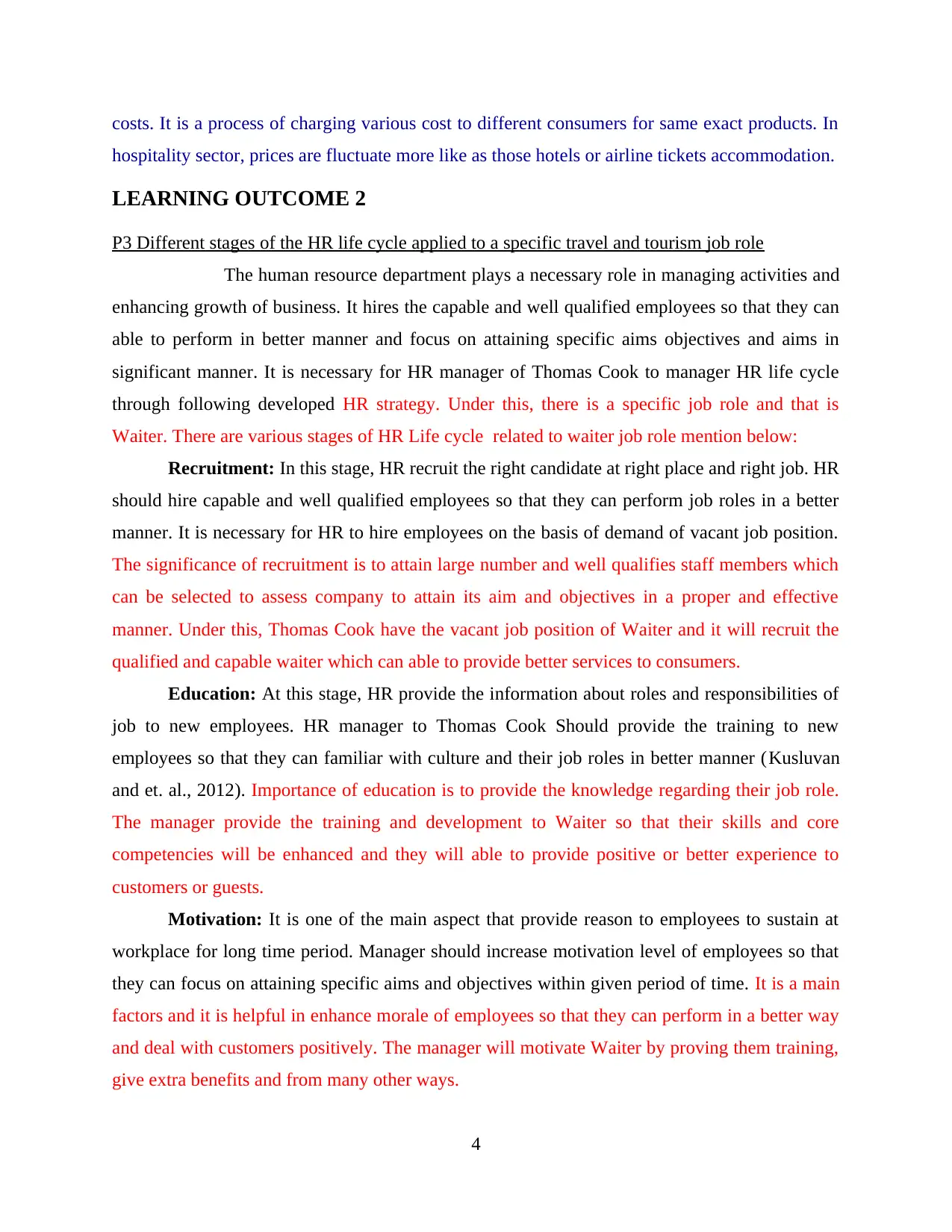
costs. It is a process of charging various cost to different consumers for same exact products. In
hospitality sector, prices are fluctuate more like as those hotels or airline tickets accommodation.
LEARNING OUTCOME 2
P3 Different stages of the HR life cycle applied to a specific travel and tourism job role
The human resource department plays a necessary role in managing activities and
enhancing growth of business. It hires the capable and well qualified employees so that they can
able to perform in better manner and focus on attaining specific aims objectives and aims in
significant manner. It is necessary for HR manager of Thomas Cook to manager HR life cycle
through following developed HR strategy. Under this, there is a specific job role and that is
Waiter. There are various stages of HR Life cycle related to waiter job role mention below:
Recruitment: In this stage, HR recruit the right candidate at right place and right job. HR
should hire capable and well qualified employees so that they can perform job roles in a better
manner. It is necessary for HR to hire employees on the basis of demand of vacant job position.
The significance of recruitment is to attain large number and well qualifies staff members which
can be selected to assess company to attain its aim and objectives in a proper and effective
manner. Under this, Thomas Cook have the vacant job position of Waiter and it will recruit the
qualified and capable waiter which can able to provide better services to consumers.
Education: At this stage, HR provide the information about roles and responsibilities of
job to new employees. HR manager to Thomas Cook Should provide the training to new
employees so that they can familiar with culture and their job roles in better manner (Kusluvan
and et. al., 2012). Importance of education is to provide the knowledge regarding their job role.
The manager provide the training and development to Waiter so that their skills and core
competencies will be enhanced and they will able to provide positive or better experience to
customers or guests.
Motivation: It is one of the main aspect that provide reason to employees to sustain at
workplace for long time period. Manager should increase motivation level of employees so that
they can focus on attaining specific aims and objectives within given period of time. It is a main
factors and it is helpful in enhance morale of employees so that they can perform in a better way
and deal with customers positively. The manager will motivate Waiter by proving them training,
give extra benefits and from many other ways.
4
hospitality sector, prices are fluctuate more like as those hotels or airline tickets accommodation.
LEARNING OUTCOME 2
P3 Different stages of the HR life cycle applied to a specific travel and tourism job role
The human resource department plays a necessary role in managing activities and
enhancing growth of business. It hires the capable and well qualified employees so that they can
able to perform in better manner and focus on attaining specific aims objectives and aims in
significant manner. It is necessary for HR manager of Thomas Cook to manager HR life cycle
through following developed HR strategy. Under this, there is a specific job role and that is
Waiter. There are various stages of HR Life cycle related to waiter job role mention below:
Recruitment: In this stage, HR recruit the right candidate at right place and right job. HR
should hire capable and well qualified employees so that they can perform job roles in a better
manner. It is necessary for HR to hire employees on the basis of demand of vacant job position.
The significance of recruitment is to attain large number and well qualifies staff members which
can be selected to assess company to attain its aim and objectives in a proper and effective
manner. Under this, Thomas Cook have the vacant job position of Waiter and it will recruit the
qualified and capable waiter which can able to provide better services to consumers.
Education: At this stage, HR provide the information about roles and responsibilities of
job to new employees. HR manager to Thomas Cook Should provide the training to new
employees so that they can familiar with culture and their job roles in better manner (Kusluvan
and et. al., 2012). Importance of education is to provide the knowledge regarding their job role.
The manager provide the training and development to Waiter so that their skills and core
competencies will be enhanced and they will able to provide positive or better experience to
customers or guests.
Motivation: It is one of the main aspect that provide reason to employees to sustain at
workplace for long time period. Manager should increase motivation level of employees so that
they can focus on attaining specific aims and objectives within given period of time. It is a main
factors and it is helpful in enhance morale of employees so that they can perform in a better way
and deal with customers positively. The manager will motivate Waiter by proving them training,
give extra benefits and from many other ways.
4
⊘ This is a preview!⊘
Do you want full access?
Subscribe today to unlock all pages.

Trusted by 1+ million students worldwide
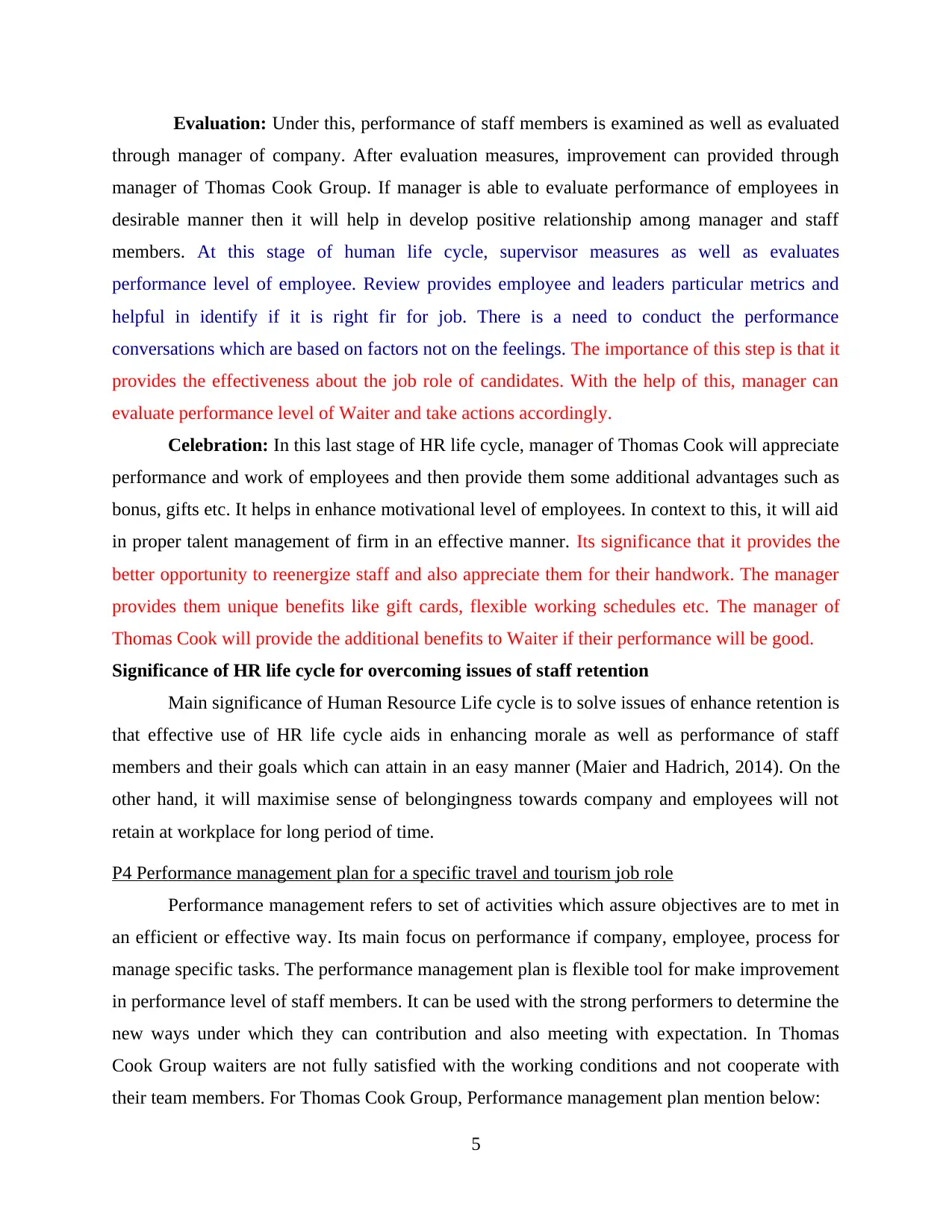
Evaluation: Under this, performance of staff members is examined as well as evaluated
through manager of company. After evaluation measures, improvement can provided through
manager of Thomas Cook Group. If manager is able to evaluate performance of employees in
desirable manner then it will help in develop positive relationship among manager and staff
members. At this stage of human life cycle, supervisor measures as well as evaluates
performance level of employee. Review provides employee and leaders particular metrics and
helpful in identify if it is right fir for job. There is a need to conduct the performance
conversations which are based on factors not on the feelings. The importance of this step is that it
provides the effectiveness about the job role of candidates. With the help of this, manager can
evaluate performance level of Waiter and take actions accordingly.
Celebration: In this last stage of HR life cycle, manager of Thomas Cook will appreciate
performance and work of employees and then provide them some additional advantages such as
bonus, gifts etc. It helps in enhance motivational level of employees. In context to this, it will aid
in proper talent management of firm in an effective manner. Its significance that it provides the
better opportunity to reenergize staff and also appreciate them for their handwork. The manager
provides them unique benefits like gift cards, flexible working schedules etc. The manager of
Thomas Cook will provide the additional benefits to Waiter if their performance will be good.
Significance of HR life cycle for overcoming issues of staff retention
Main significance of Human Resource Life cycle is to solve issues of enhance retention is
that effective use of HR life cycle aids in enhancing morale as well as performance of staff
members and their goals which can attain in an easy manner (Maier and Hadrich, 2014). On the
other hand, it will maximise sense of belongingness towards company and employees will not
retain at workplace for long period of time.
P4 Performance management plan for a specific travel and tourism job role
Performance management refers to set of activities which assure objectives are to met in
an efficient or effective way. Its main focus on performance if company, employee, process for
manage specific tasks. The performance management plan is flexible tool for make improvement
in performance level of staff members. It can be used with the strong performers to determine the
new ways under which they can contribution and also meeting with expectation. In Thomas
Cook Group waiters are not fully satisfied with the working conditions and not cooperate with
their team members. For Thomas Cook Group, Performance management plan mention below:
5
through manager of company. After evaluation measures, improvement can provided through
manager of Thomas Cook Group. If manager is able to evaluate performance of employees in
desirable manner then it will help in develop positive relationship among manager and staff
members. At this stage of human life cycle, supervisor measures as well as evaluates
performance level of employee. Review provides employee and leaders particular metrics and
helpful in identify if it is right fir for job. There is a need to conduct the performance
conversations which are based on factors not on the feelings. The importance of this step is that it
provides the effectiveness about the job role of candidates. With the help of this, manager can
evaluate performance level of Waiter and take actions accordingly.
Celebration: In this last stage of HR life cycle, manager of Thomas Cook will appreciate
performance and work of employees and then provide them some additional advantages such as
bonus, gifts etc. It helps in enhance motivational level of employees. In context to this, it will aid
in proper talent management of firm in an effective manner. Its significance that it provides the
better opportunity to reenergize staff and also appreciate them for their handwork. The manager
provides them unique benefits like gift cards, flexible working schedules etc. The manager of
Thomas Cook will provide the additional benefits to Waiter if their performance will be good.
Significance of HR life cycle for overcoming issues of staff retention
Main significance of Human Resource Life cycle is to solve issues of enhance retention is
that effective use of HR life cycle aids in enhancing morale as well as performance of staff
members and their goals which can attain in an easy manner (Maier and Hadrich, 2014). On the
other hand, it will maximise sense of belongingness towards company and employees will not
retain at workplace for long period of time.
P4 Performance management plan for a specific travel and tourism job role
Performance management refers to set of activities which assure objectives are to met in
an efficient or effective way. Its main focus on performance if company, employee, process for
manage specific tasks. The performance management plan is flexible tool for make improvement
in performance level of staff members. It can be used with the strong performers to determine the
new ways under which they can contribution and also meeting with expectation. In Thomas
Cook Group waiters are not fully satisfied with the working conditions and not cooperate with
their team members. For Thomas Cook Group, Performance management plan mention below:
5
Paraphrase This Document
Need a fresh take? Get an instant paraphrase of this document with our AI Paraphraser
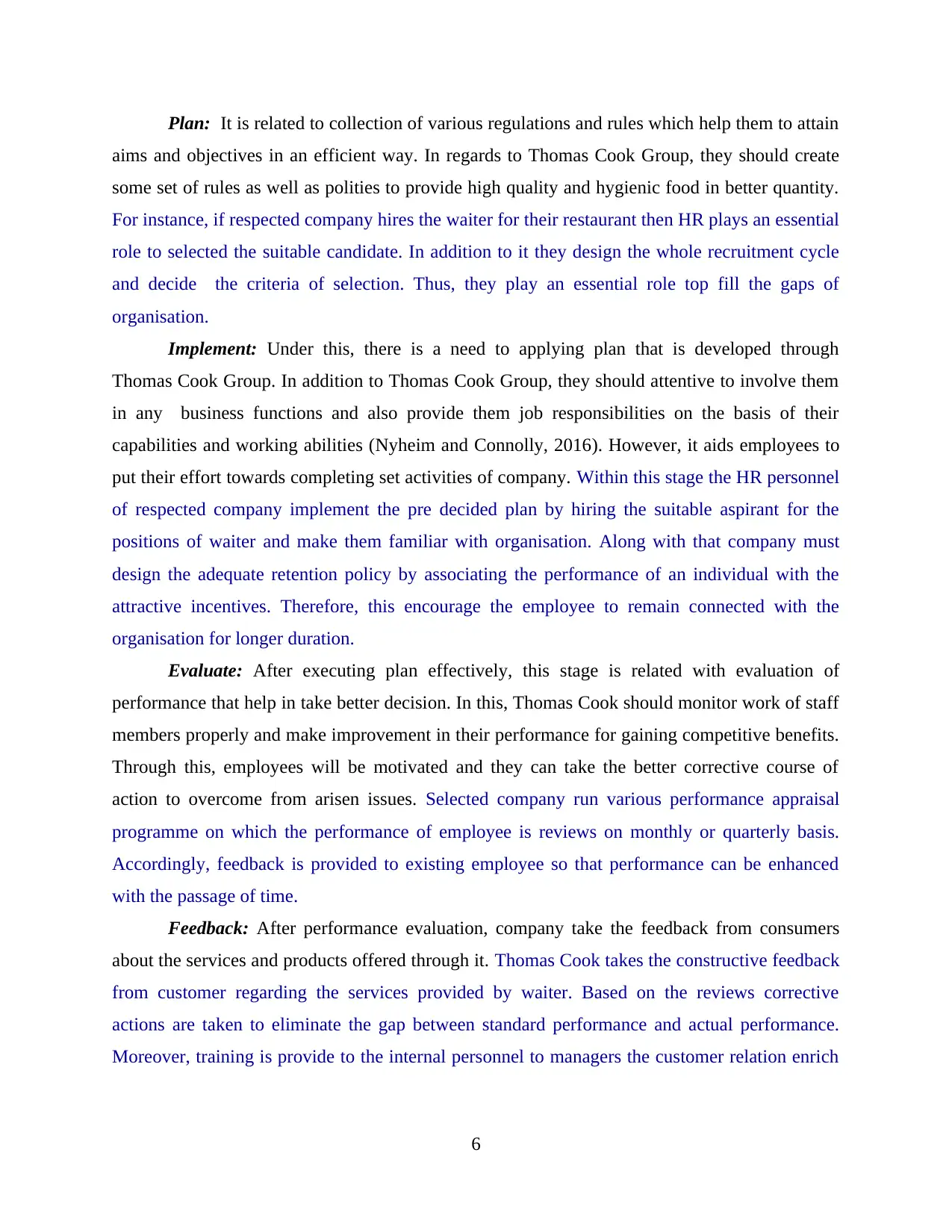
Plan: It is related to collection of various regulations and rules which help them to attain
aims and objectives in an efficient way. In regards to Thomas Cook Group, they should create
some set of rules as well as polities to provide high quality and hygienic food in better quantity.
For instance, if respected company hires the waiter for their restaurant then HR plays an essential
role to selected the suitable candidate. In addition to it they design the whole recruitment cycle
and decide the criteria of selection. Thus, they play an essential role top fill the gaps of
organisation.
Implement: Under this, there is a need to applying plan that is developed through
Thomas Cook Group. In addition to Thomas Cook Group, they should attentive to involve them
in any business functions and also provide them job responsibilities on the basis of their
capabilities and working abilities (Nyheim and Connolly, 2016). However, it aids employees to
put their effort towards completing set activities of company. Within this stage the HR personnel
of respected company implement the pre decided plan by hiring the suitable aspirant for the
positions of waiter and make them familiar with organisation. Along with that company must
design the adequate retention policy by associating the performance of an individual with the
attractive incentives. Therefore, this encourage the employee to remain connected with the
organisation for longer duration.
Evaluate: After executing plan effectively, this stage is related with evaluation of
performance that help in take better decision. In this, Thomas Cook should monitor work of staff
members properly and make improvement in their performance for gaining competitive benefits.
Through this, employees will be motivated and they can take the better corrective course of
action to overcome from arisen issues. Selected company run various performance appraisal
programme on which the performance of employee is reviews on monthly or quarterly basis.
Accordingly, feedback is provided to existing employee so that performance can be enhanced
with the passage of time.
Feedback: After performance evaluation, company take the feedback from consumers
about the services and products offered through it. Thomas Cook takes the constructive feedback
from customer regarding the services provided by waiter. Based on the reviews corrective
actions are taken to eliminate the gap between standard performance and actual performance.
Moreover, training is provide to the internal personnel to managers the customer relation enrich
6
aims and objectives in an efficient way. In regards to Thomas Cook Group, they should create
some set of rules as well as polities to provide high quality and hygienic food in better quantity.
For instance, if respected company hires the waiter for their restaurant then HR plays an essential
role to selected the suitable candidate. In addition to it they design the whole recruitment cycle
and decide the criteria of selection. Thus, they play an essential role top fill the gaps of
organisation.
Implement: Under this, there is a need to applying plan that is developed through
Thomas Cook Group. In addition to Thomas Cook Group, they should attentive to involve them
in any business functions and also provide them job responsibilities on the basis of their
capabilities and working abilities (Nyheim and Connolly, 2016). However, it aids employees to
put their effort towards completing set activities of company. Within this stage the HR personnel
of respected company implement the pre decided plan by hiring the suitable aspirant for the
positions of waiter and make them familiar with organisation. Along with that company must
design the adequate retention policy by associating the performance of an individual with the
attractive incentives. Therefore, this encourage the employee to remain connected with the
organisation for longer duration.
Evaluate: After executing plan effectively, this stage is related with evaluation of
performance that help in take better decision. In this, Thomas Cook should monitor work of staff
members properly and make improvement in their performance for gaining competitive benefits.
Through this, employees will be motivated and they can take the better corrective course of
action to overcome from arisen issues. Selected company run various performance appraisal
programme on which the performance of employee is reviews on monthly or quarterly basis.
Accordingly, feedback is provided to existing employee so that performance can be enhanced
with the passage of time.
Feedback: After performance evaluation, company take the feedback from consumers
about the services and products offered through it. Thomas Cook takes the constructive feedback
from customer regarding the services provided by waiter. Based on the reviews corrective
actions are taken to eliminate the gap between standard performance and actual performance.
Moreover, training is provide to the internal personnel to managers the customer relation enrich
6
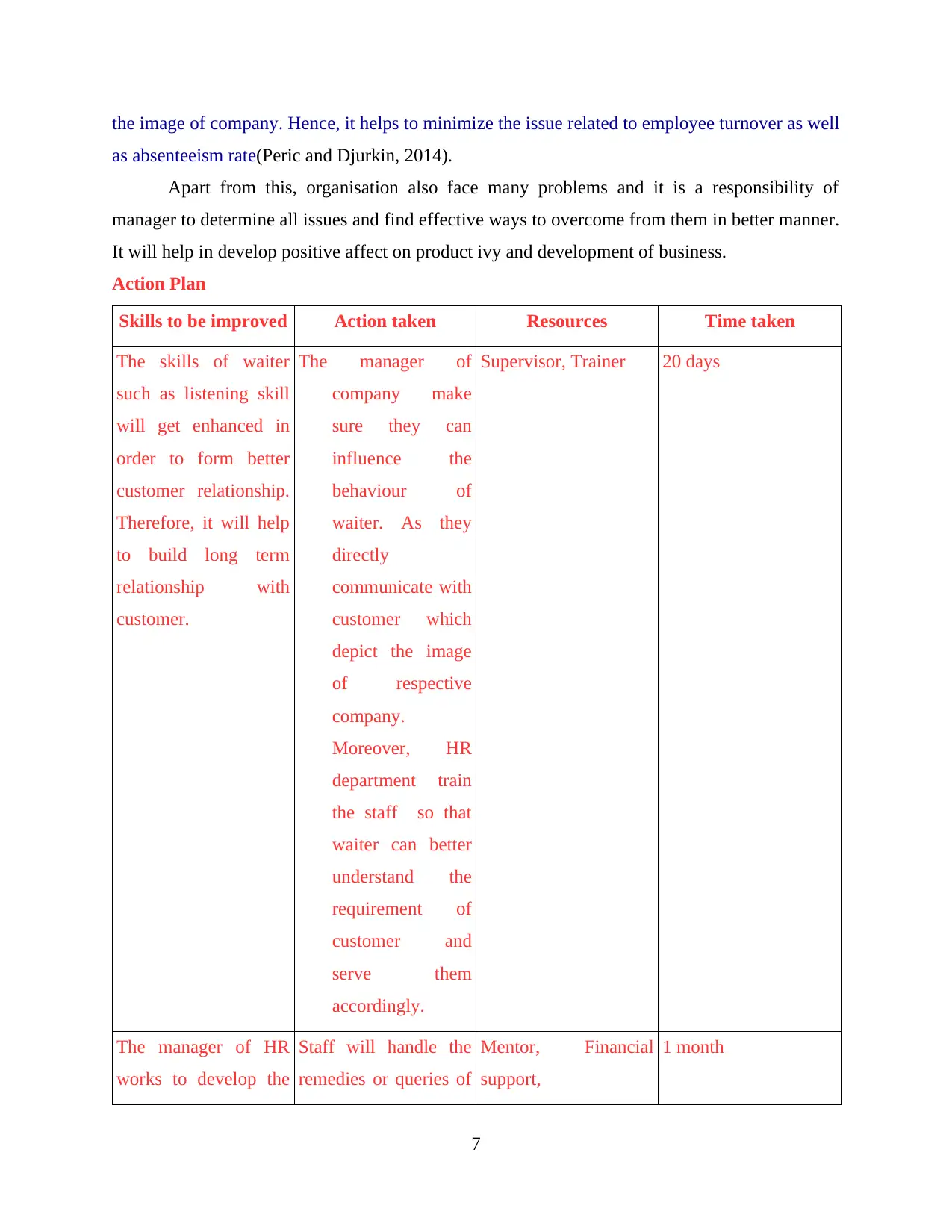
the image of company. Hence, it helps to minimize the issue related to employee turnover as well
as absenteeism rate(Peric and Djurkin, 2014).
Apart from this, organisation also face many problems and it is a responsibility of
manager to determine all issues and find effective ways to overcome from them in better manner.
It will help in develop positive affect on product ivy and development of business.
Action Plan
Skills to be improved Action taken Resources Time taken
The skills of waiter
such as listening skill
will get enhanced in
order to form better
customer relationship.
Therefore, it will help
to build long term
relationship with
customer.
The manager of
company make
sure they can
influence the
behaviour of
waiter. As they
directly
communicate with
customer which
depict the image
of respective
company.
Moreover, HR
department train
the staff so that
waiter can better
understand the
requirement of
customer and
serve them
accordingly.
Supervisor, Trainer 20 days
The manager of HR
works to develop the
Staff will handle the
remedies or queries of
Mentor, Financial
support,
1 month
7
as absenteeism rate(Peric and Djurkin, 2014).
Apart from this, organisation also face many problems and it is a responsibility of
manager to determine all issues and find effective ways to overcome from them in better manner.
It will help in develop positive affect on product ivy and development of business.
Action Plan
Skills to be improved Action taken Resources Time taken
The skills of waiter
such as listening skill
will get enhanced in
order to form better
customer relationship.
Therefore, it will help
to build long term
relationship with
customer.
The manager of
company make
sure they can
influence the
behaviour of
waiter. As they
directly
communicate with
customer which
depict the image
of respective
company.
Moreover, HR
department train
the staff so that
waiter can better
understand the
requirement of
customer and
serve them
accordingly.
Supervisor, Trainer 20 days
The manager of HR
works to develop the
Staff will handle the
remedies or queries of
Mentor, Financial
support,
1 month
7
⊘ This is a preview!⊘
Do you want full access?
Subscribe today to unlock all pages.

Trusted by 1+ million students worldwide
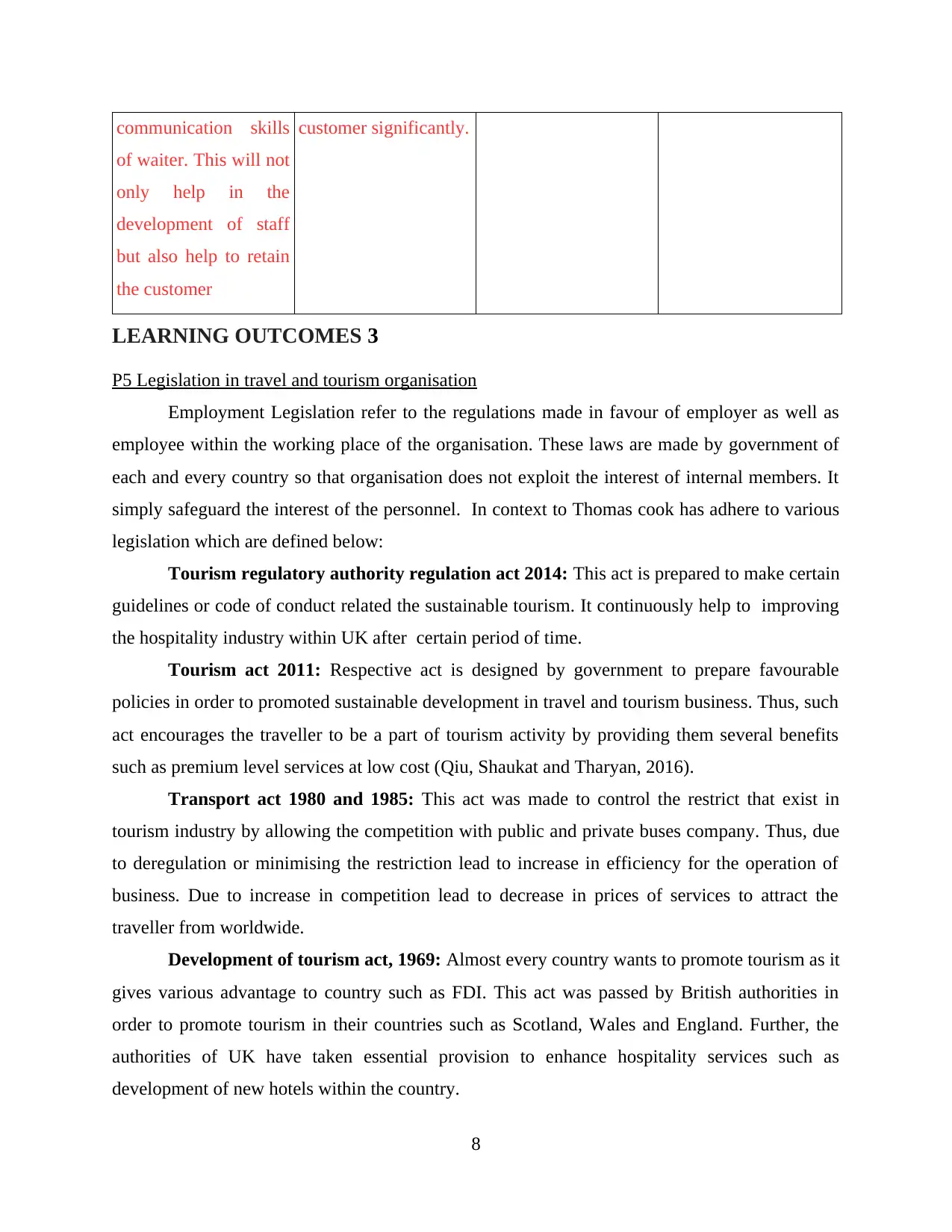
communication skills
of waiter. This will not
only help in the
development of staff
but also help to retain
the customer
customer significantly.
LEARNING OUTCOMES 3
P5 Legislation in travel and tourism organisation
Employment Legislation refer to the regulations made in favour of employer as well as
employee within the working place of the organisation. These laws are made by government of
each and every country so that organisation does not exploit the interest of internal members. It
simply safeguard the interest of the personnel. In context to Thomas cook has adhere to various
legislation which are defined below:
Tourism regulatory authority regulation act 2014: This act is prepared to make certain
guidelines or code of conduct related the sustainable tourism. It continuously help to improving
the hospitality industry within UK after certain period of time.
Tourism act 2011: Respective act is designed by government to prepare favourable
policies in order to promoted sustainable development in travel and tourism business. Thus, such
act encourages the traveller to be a part of tourism activity by providing them several benefits
such as premium level services at low cost (Qiu, Shaukat and Tharyan, 2016).
Transport act 1980 and 1985: This act was made to control the restrict that exist in
tourism industry by allowing the competition with public and private buses company. Thus, due
to deregulation or minimising the restriction lead to increase in efficiency for the operation of
business. Due to increase in competition lead to decrease in prices of services to attract the
traveller from worldwide.
Development of tourism act, 1969: Almost every country wants to promote tourism as it
gives various advantage to country such as FDI. This act was passed by British authorities in
order to promote tourism in their countries such as Scotland, Wales and England. Further, the
authorities of UK have taken essential provision to enhance hospitality services such as
development of new hotels within the country.
8
of waiter. This will not
only help in the
development of staff
but also help to retain
the customer
customer significantly.
LEARNING OUTCOMES 3
P5 Legislation in travel and tourism organisation
Employment Legislation refer to the regulations made in favour of employer as well as
employee within the working place of the organisation. These laws are made by government of
each and every country so that organisation does not exploit the interest of internal members. It
simply safeguard the interest of the personnel. In context to Thomas cook has adhere to various
legislation which are defined below:
Tourism regulatory authority regulation act 2014: This act is prepared to make certain
guidelines or code of conduct related the sustainable tourism. It continuously help to improving
the hospitality industry within UK after certain period of time.
Tourism act 2011: Respective act is designed by government to prepare favourable
policies in order to promoted sustainable development in travel and tourism business. Thus, such
act encourages the traveller to be a part of tourism activity by providing them several benefits
such as premium level services at low cost (Qiu, Shaukat and Tharyan, 2016).
Transport act 1980 and 1985: This act was made to control the restrict that exist in
tourism industry by allowing the competition with public and private buses company. Thus, due
to deregulation or minimising the restriction lead to increase in efficiency for the operation of
business. Due to increase in competition lead to decrease in prices of services to attract the
traveller from worldwide.
Development of tourism act, 1969: Almost every country wants to promote tourism as it
gives various advantage to country such as FDI. This act was passed by British authorities in
order to promote tourism in their countries such as Scotland, Wales and England. Further, the
authorities of UK have taken essential provision to enhance hospitality services such as
development of new hotels within the country.
8
Paraphrase This Document
Need a fresh take? Get an instant paraphrase of this document with our AI Paraphraser
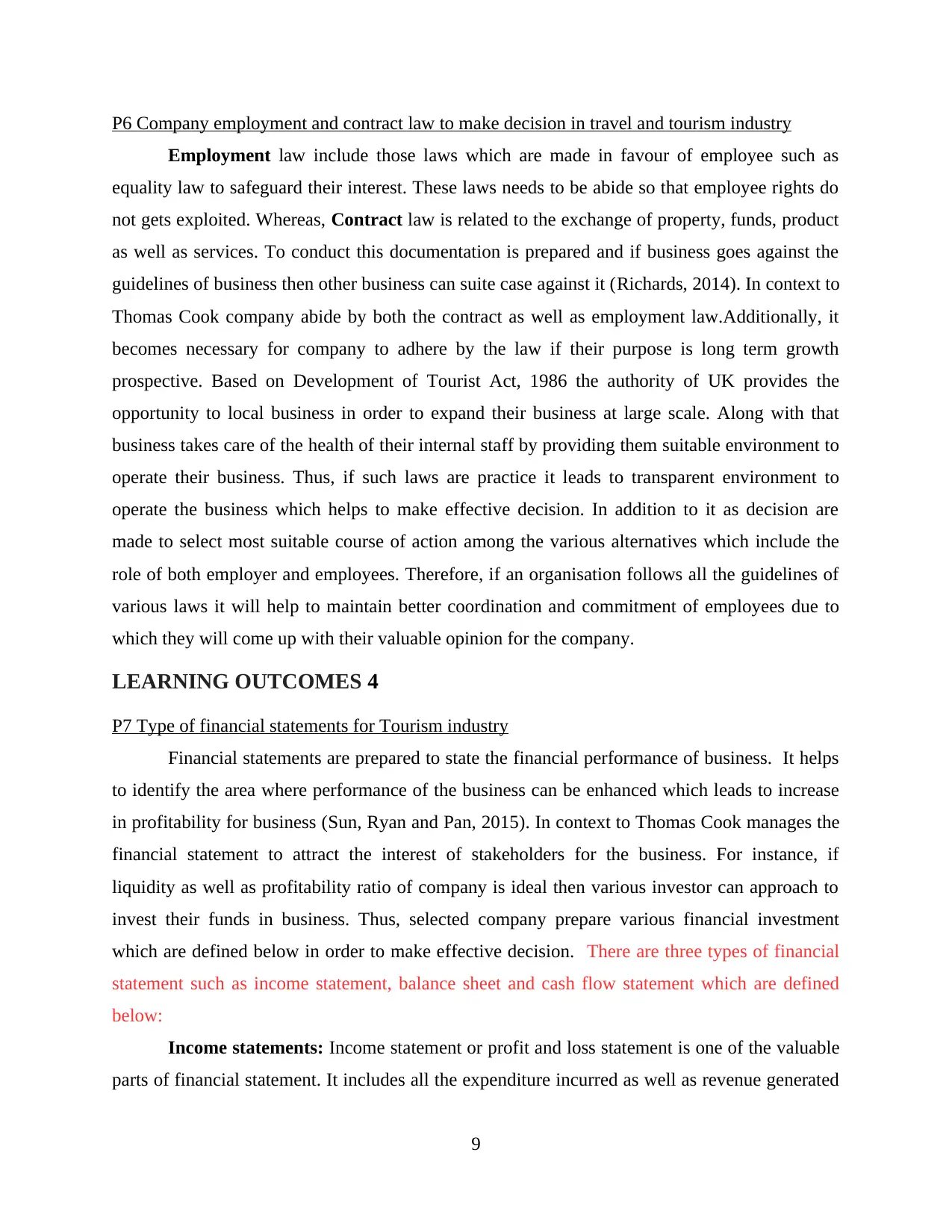
P6 Company employment and contract law to make decision in travel and tourism industry
Employment law include those laws which are made in favour of employee such as
equality law to safeguard their interest. These laws needs to be abide so that employee rights do
not gets exploited. Whereas, Contract law is related to the exchange of property, funds, product
as well as services. To conduct this documentation is prepared and if business goes against the
guidelines of business then other business can suite case against it (Richards, 2014). In context to
Thomas Cook company abide by both the contract as well as employment law.Additionally, it
becomes necessary for company to adhere by the law if their purpose is long term growth
prospective. Based on Development of Tourist Act, 1986 the authority of UK provides the
opportunity to local business in order to expand their business at large scale. Along with that
business takes care of the health of their internal staff by providing them suitable environment to
operate their business. Thus, if such laws are practice it leads to transparent environment to
operate the business which helps to make effective decision. In addition to it as decision are
made to select most suitable course of action among the various alternatives which include the
role of both employer and employees. Therefore, if an organisation follows all the guidelines of
various laws it will help to maintain better coordination and commitment of employees due to
which they will come up with their valuable opinion for the company.
LEARNING OUTCOMES 4
P7 Type of financial statements for Tourism industry
Financial statements are prepared to state the financial performance of business. It helps
to identify the area where performance of the business can be enhanced which leads to increase
in profitability for business (Sun, Ryan and Pan, 2015). In context to Thomas Cook manages the
financial statement to attract the interest of stakeholders for the business. For instance, if
liquidity as well as profitability ratio of company is ideal then various investor can approach to
invest their funds in business. Thus, selected company prepare various financial investment
which are defined below in order to make effective decision. There are three types of financial
statement such as income statement, balance sheet and cash flow statement which are defined
below:
Income statements: Income statement or profit and loss statement is one of the valuable
parts of financial statement. It includes all the expenditure incurred as well as revenue generated
9
Employment law include those laws which are made in favour of employee such as
equality law to safeguard their interest. These laws needs to be abide so that employee rights do
not gets exploited. Whereas, Contract law is related to the exchange of property, funds, product
as well as services. To conduct this documentation is prepared and if business goes against the
guidelines of business then other business can suite case against it (Richards, 2014). In context to
Thomas Cook company abide by both the contract as well as employment law.Additionally, it
becomes necessary for company to adhere by the law if their purpose is long term growth
prospective. Based on Development of Tourist Act, 1986 the authority of UK provides the
opportunity to local business in order to expand their business at large scale. Along with that
business takes care of the health of their internal staff by providing them suitable environment to
operate their business. Thus, if such laws are practice it leads to transparent environment to
operate the business which helps to make effective decision. In addition to it as decision are
made to select most suitable course of action among the various alternatives which include the
role of both employer and employees. Therefore, if an organisation follows all the guidelines of
various laws it will help to maintain better coordination and commitment of employees due to
which they will come up with their valuable opinion for the company.
LEARNING OUTCOMES 4
P7 Type of financial statements for Tourism industry
Financial statements are prepared to state the financial performance of business. It helps
to identify the area where performance of the business can be enhanced which leads to increase
in profitability for business (Sun, Ryan and Pan, 2015). In context to Thomas Cook manages the
financial statement to attract the interest of stakeholders for the business. For instance, if
liquidity as well as profitability ratio of company is ideal then various investor can approach to
invest their funds in business. Thus, selected company prepare various financial investment
which are defined below in order to make effective decision. There are three types of financial
statement such as income statement, balance sheet and cash flow statement which are defined
below:
Income statements: Income statement or profit and loss statement is one of the valuable
parts of financial statement. It includes all the expenditure incurred as well as revenue generated
9
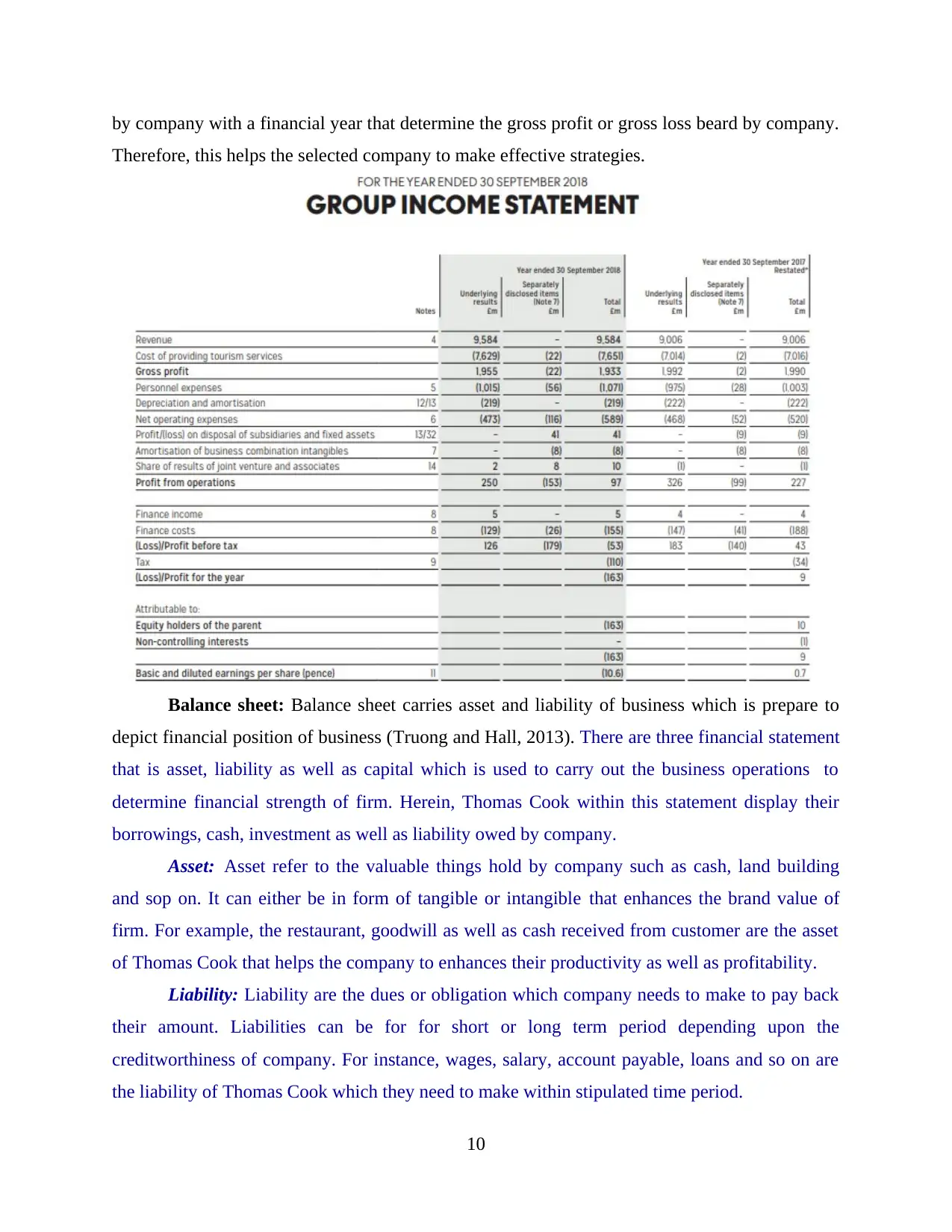
by company with a financial year that determine the gross profit or gross loss beard by company.
Therefore, this helps the selected company to make effective strategies.
Balance sheet: Balance sheet carries asset and liability of business which is prepare to
depict financial position of business (Truong and Hall, 2013). There are three financial statement
that is asset, liability as well as capital which is used to carry out the business operations to
determine financial strength of firm. Herein, Thomas Cook within this statement display their
borrowings, cash, investment as well as liability owed by company.
Asset: Asset refer to the valuable things hold by company such as cash, land building
and sop on. It can either be in form of tangible or intangible that enhances the brand value of
firm. For example, the restaurant, goodwill as well as cash received from customer are the asset
of Thomas Cook that helps the company to enhances their productivity as well as profitability.
Liability: Liability are the dues or obligation which company needs to make to pay back
their amount. Liabilities can be for for short or long term period depending upon the
creditworthiness of company. For instance, wages, salary, account payable, loans and so on are
the liability of Thomas Cook which they need to make within stipulated time period.
10
Therefore, this helps the selected company to make effective strategies.
Balance sheet: Balance sheet carries asset and liability of business which is prepare to
depict financial position of business (Truong and Hall, 2013). There are three financial statement
that is asset, liability as well as capital which is used to carry out the business operations to
determine financial strength of firm. Herein, Thomas Cook within this statement display their
borrowings, cash, investment as well as liability owed by company.
Asset: Asset refer to the valuable things hold by company such as cash, land building
and sop on. It can either be in form of tangible or intangible that enhances the brand value of
firm. For example, the restaurant, goodwill as well as cash received from customer are the asset
of Thomas Cook that helps the company to enhances their productivity as well as profitability.
Liability: Liability are the dues or obligation which company needs to make to pay back
their amount. Liabilities can be for for short or long term period depending upon the
creditworthiness of company. For instance, wages, salary, account payable, loans and so on are
the liability of Thomas Cook which they need to make within stipulated time period.
10
⊘ This is a preview!⊘
Do you want full access?
Subscribe today to unlock all pages.

Trusted by 1+ million students worldwide
1 out of 17
Related Documents
Your All-in-One AI-Powered Toolkit for Academic Success.
+13062052269
info@desklib.com
Available 24*7 on WhatsApp / Email
![[object Object]](/_next/static/media/star-bottom.7253800d.svg)
Unlock your academic potential
Copyright © 2020–2026 A2Z Services. All Rights Reserved. Developed and managed by ZUCOL.




